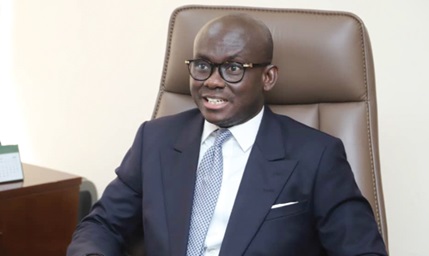
Public officers law will strengthen corruption fight — A-G
The Attorney-General and Minister of Justice, Godfred Yeboah Dame, has stated that a proposed law on the conduct of public officers will strengthen the fight against corruption in the country.
He said the draft Code of Conduct of Public Officers Bill when passed into law would, among other things, seek to prevent public officers from using their office to enrich themselves.
“The Conduct of Public Officers Law will address issues like financial portfolios held by public officers before assuming public office, links to family business, improper enrichment, self-dealing, partiality in the performance of duties, sexual harassment, abuse of women and use of public or confidential information to further private interest,” he said.
Mr Dame, who was speaking at the 10th Conference of States Parties to the United Nations Convention against Corruption (COSP 10) in Atlanta, USA, said the draft bill had undergone extensive consultation and was currently before cabinet for consideration before presentation to Parliament.
Convention against corruption
The United Nations Convention against Corruption (UNCAC) is the only legally binding international anti-corruption multilateral treaty which was adopted by the UN General Assembly 2003 by Resolution 58/4.
It came into force in 2005 and as of October this year, 190 countries had signed and ratified it.
Ghana signed on December 9, 2004 and ratified it on June 27, 2007.
The convention enjoins state parties to adopt preventive policies against corruption such as the establishment, strengthening and ensuring independence of anti-corruption agencies, enhancing transparency in financing of election campaigns and political parties.
As part of their commitments, state parties must also promote transparency in public service by ensuring merit-based recruitment, accountability in the management of public finances and safeguards to prevent corruption in the sector.
Also, state parties are to criminalise corruption, bribery and lack of accountability and transparency, obstruction of justice, and the concealment, conversion or transfer of criminal proceeds (money laundering) and other related activities with punitive consequences.
The Conference of States Parties to the United Nations Convention against Corruption is held every two years to provide a platform for state parties of the convention to share ideas and deepen collaboration on the fight against corruption.
Conduct of public officials
The Attorney-General’s assurance on the draft bill on conduct of public officials comes on the back of various calls by anti-graft agencies and civil society organisations for a law that would properly regulate the conduct of public officials.
According to the proponents of such calls, a law in that regard would plug a loophole in the fight against corruption whereby some public officials were let off the hook because their alleged ‘improper conducts’ could not be classified as corruption within the framework of the existing laws of the country.
During a press conference on November 29, this year, the Special Prosecutor, the foremost anti-corruption officer, Kissi Agyebeng, emphasised the importance of the passage of such a law to enhance the fight against corruption.
Mr Agyebeng made the observation in response to a question on why his outfit could not prosecute certain former public officials whose alleged actions though improper could not be deemed as corrupt acts.
In July, this year, a pressure group, OccupyGhana, also demanded from the government the passage of the Conduct of Public Officers Bill, 2022, to amend and help strengthen the current public officers’ asset declaration regime.
The bill, it said, when passed into law would prevent the issue of public officers having “unexplained wealth” with the laws of the country seemingly “impotent in dealing with it.”
Commitment
Addressing the COSP 10, Mr Dame said the government’s commitment to fight corruption remained resolute.
He mentioned the establishment of the Office of the Special Prosecutor (OSP), and the increase in funding for anti-graft agencies as part of the efforts by the government to tackle corruption.
The principal legal advisor to the government indicated that the passage of various enactments by the government was a strong testament to its readiness to fight corruption.
Some of the laws, he mentioned, included the Companies Act, 2019 (Act 992), Witness Protection Act, 2018 (Act 975), and its amendment which offered a reward system for those who exposed graft and other acts of impropriety, and the Right to Information Act, 2019 (Act 989).
“The control of corruption requires the establishment of a system backed by legislation which not only deters its perpetration but also punishes effectively through an honest, fair and efficient justice system,” he said.
Writer’s email:
